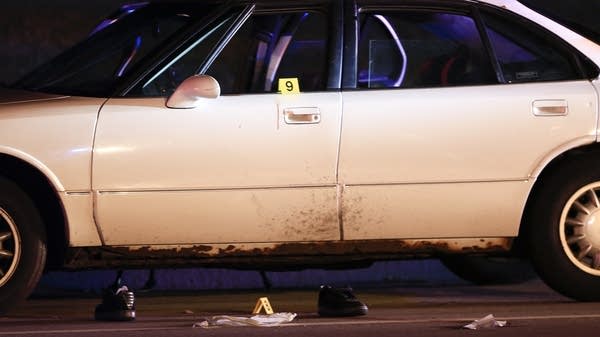Falcon Heights residents call for policing changes after Castile shooting

Go Deeper.
Create an account or log in to save stories.
Like this?
Thanks for liking this story! We have added it to a list of your favorite stories.
Three weeks after the death of Philando Castile, some residents of Falcon Heights continue to press community leaders to end the city's contract with the St. Anthony Police Department.
St. Anthony Officer Jeronimo Yanez shot and killed the 32-year-old black man July 6 during a traffic stop on Larpenteur Avenue. At a City Council listening session Wednesday night dozens of people called for major changes in how their city is policed.
The emotion was evident in their voices as they recalled the killing of Castile that put this suburb in headlines around the world.
Resident Kay Andrews, who's white, wants to see immediate change in the policing of Falcon Heights. For Andrews, it's personal. She described how officers once stopped her African-American grandson in front of their house as he returned from work.
Turn Up Your Support
MPR News helps you turn down the noise and build shared understanding. Turn up your support for this public resource and keep trusted journalism accessible to all.
"One of the cops pulled up and said 'Who are you? What are you doing here?' He said 'I live here, I'm going home to bed.' And they said 'Do you have ID to prove that?'"
Andrews said the officers put her grandson in the back of their squad car while they checked his records. She fears for his safety.
"I can't speak for them. I'm not black. But I know their pain," she said. "Any of them could have been the victim of this kind of a killing."
Resident Tom Brace, a former state fire marshal who's worked alongside many public safety officials, said that at the very least Falcon Heights should take a close look at its contract with St. Anthony and think hard about the kind of policing it wants.
"Get that contract out, have the city's attorney review it," he said. "And let's ask some basic questions. Do we have any ability to change it? What are the provisions to change that contract?"
Many African-Americans at the meeting talked about getting pulled over frequently on Larpenteur Avenue — the main route through Falcon Heights where officers stopped Castile.
John Thompson, who works for St. Paul Public Schools and knew Castile, said Larpenteur is known as a hot spot for racial profiling.
"I never travel that stretch of Larpenteur. And you can ask 100 black men, and they'll tell you we never travel that route simply because we know we're going to be harassed by the police," he said. "We know we're going to have to get out of our car. We know we're going to have to lay down on the ground. We know we're going to be treated differently than any other traffic stop."
Thompson remembered Castile as a warm and generous young man who was passionate about the children he served as a cafeteria supervisor at J.J. Hill Montessori.
That was a sentiment echoed by Valerie Castile, Philando's mother. Bringing the meeting to a close, she urged the council to act quickly and decisively.
"I just want to let you know that I hope you do the right thing. Someone has to step up and hold people accountable for their behavior," she said.
Others said change is not coming fast enough in Falcon Heights. After the meeting Mayor Peter Lindstrom said he understands residents' frustration.
"People are passionate. People are interested. People have great ideas, and we're all ears right now," he said. "But that needs to translate into action sooner rather than later."
While no changes to the police contract are imminent, Lindstrom said he doesn't need to wait for the Bureau of Criminal Apprehension to complete its investigation of the shooting before acting.
But at the same time he said overhauling the police contract requires careful deliberation and more input from residents. Lindstrom said he expects to hold more public meetings on the topic soon.



